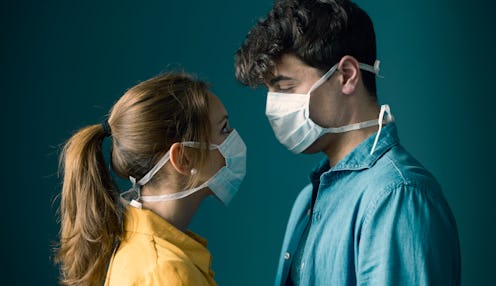
After months of controlling your surroundings — by staying home, washing your hands, and hanging out just the two of you — the time has come for your partner to go back to work. While essential workers have been showing up throughout the pandemic, other businesses are slowly starting to reopen. If your partner works in an office, for example, this could mean they're venturing out into the world for the first time in months.
You might worry that your partner will get sick or that you'll get sick, or that someone else will get sick — not to mention the impact it will make on your relationship routine. The best way to handle the change or course, according to Dana McNeil, LMFT, a licensed marriage and family therapist, is by communicating your concerns and coming up with a plan before they even step out the door.
Decide early on the level of precaution you'd like to take, and what you'd both be willing to do to keep yourselves safe. Consider things like the type of work your partner does, how much human contact they'll have, and your health. You might not see eye-to-eye at first, McNeil says, but if you compromise, you should be able to come up with a good post-work protocol that both you and your partner can follow every day.
So, what are some ways to alleviate the risk? You know all about hand-washing, wearing a mask, and social distancing as much as possible, and these are things your partner should continue doing as they go back to work. It'll lower their risk of getting sick, as well as your own risk as you continue to work from home. But there are plenty of other tricks to keep you both safer, including asking them to do whatever they can to limit the amount of germs they drag into the house.
"The moment the working person comes home it may not be a bad idea to remove all clothing and shoes at the door," Dr. Janette Nesheiwat, a family and emergency doctor, tells Bustle. Your partner should put their work clothes directly in the wash, and then take a shower. That way they won't spread germs around the apartment by sitting on the couch first, or rummaging through the fridge. (At the very least, they should wash their hands immediately.)
From there, you could avoid kissing or hugging, especially if you happen to be high-risk or have a weakened immune system, Nesheiwat says. Instead, make a point of keeping your distance as much as possible. And, if you have the option, one of you may also consider sleeping on the couch as opposed to in the same bed, she says, to further limit your risk.
As Dr. Rodney Rohde, a medical laboratory professional and infectious disease expert, tells Bustle, you could even designate certain areas of the house for your partner to hang out in by themselves. "The primary issue facing this situation will be trying to maintain some sort of distancing and health precautions (surface disinfection) of shared spaces in a living area," he says. If your partner can chill in a spare room, or have a certain chair that's just for them, it'll help contain their germs.
Whether you have extra space or not, your partner should be washing their hands frequently and disinfecting surfaces after use, such as wiping off the table after eating breakfast, or spraying down the sink after brushing their teeth. They can also alert you to where they've been, Rohde says, so you know to avoid the area.
From there, continue to monitor your health as your partner goes back to work, and ask them to do the same. "Check your temperature often," Nesheiwat says. If either of you has a fever, stay away from each other and contact your doctor for advice. Consider getting the antibody test as well, if accessible, to see if one or both of you has already been exposed to the virus in the past.
Since these steps are helpful but definitely not ideal, make an extra effort to connect with each other so that you don't start to feel isolated or alone. "Spend time checking in with your partner about some of the hardest parts of their day," McNeil says, "or ask them what is most challenging for them." Assure each other these aren't permanent changes, but helpful, temporary ones.
And don't forget about enjoying each other's company, either — as much as you can given the circumstances. "Now is the time to dig out comedies, memes, and gifs that make you laugh and to share them during the day," McNeils says. Once they get home, you could watch movies together from opposite sides of the couch, and check in with friends on Zoom.
"The more you laugh," McNeil says, "the more of the feel-good chemicals such as oxytocin, serotonin, and dopamine will be released that will give you daily doses of the kinds of coping skills you both need to get through this time in your life."
Experts:
Dana McNeil, LMFT, therapist
Dr. Janette Nesheiwat, family and emergency doctor
Dr. Rodney Rohde, medical laboratory professional and infectious disease expert